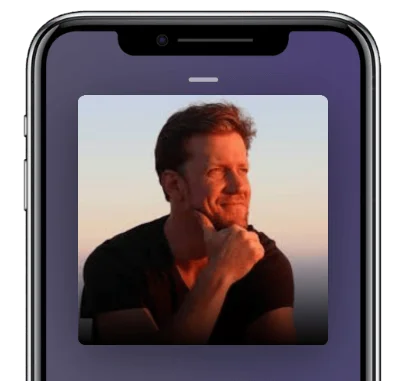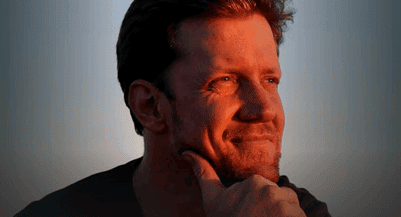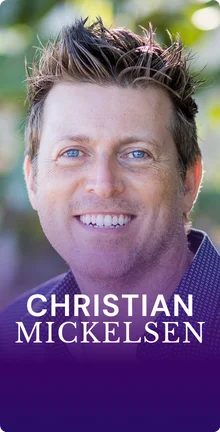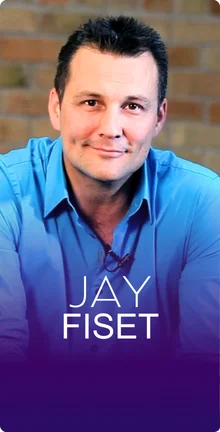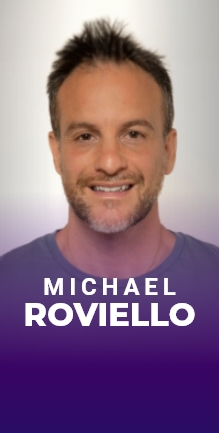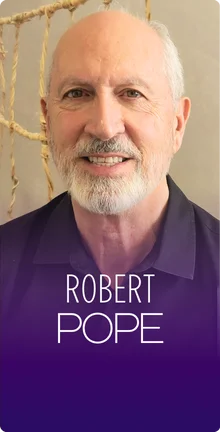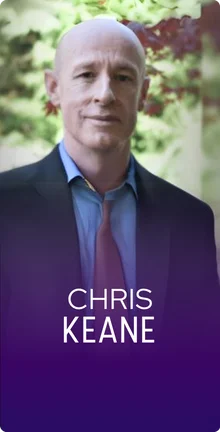In this Episode
- [01:58]Sam starts things off by sharing his story.
- [03:31]We hear about Sam’s current mindset about his injury and its consequences. He makes clear that he has to be intentional about seeing his injury as a gift.
- [04:59]Would Sam say that his Zen Warrior Training wouldn’t exist if he hadn’t been injured? As he answers, he points out that just about everyone has some kind of paralyzing event — even if they aren’t literally paralyzed (as he is).
- [06:50]The most important part of the Zen mindset is welcoming every experience without judgment.
- [08:47]Sam explains that reacting to the way that things are is giving up our power to make a choice about how to experience our circumstances. He then digs into what “surrender” means.
- [10:36]There is one thing that we can control; Sam explains what it is, and reveals its importance through a personal example.
- [14:55]Sam talks about breath training, which he finds to be one of the most effective tools for him.
- [17:19]We hear more about the relation between breath training and mindfulness, with Sam explaining that we connect to spirit through connecting to the breath. Once more, he offers a powerful personal example to explain his perspective.
- [23:28]Has Sam had that level of profound experience with breathing exercises since the examples he just described, or were those the pinnacles?
- [25:10]Sam discusses the physical symptoms of his injury, which were always consistent. His healing took place on an energetic level instead. He then explores how he returned to feeling himself as whole after his paralysis.
- [27:57]Stephan shares a profound breath-related experience of his own, which took place on a trip to India.
- [30:43]It’s possible to experience the fact that you are more than your consciousness, but the point gets lost in the explanation, Sam explains. He and Stephan then talk about how disconcerting (and liberating) the process of changing your perspective in that way can be.
- [34:29]You are far more than your thoughts, feelings, and body; you are consciousness itself. Sam digs further into this concept, explaining the sensation of coming to this realization.
- [36:32]What would be an example of a shift that one of Sam’s clients made in which they realized that they are the space (or nothingness) in which things occur?
- [39:09]Sam’s physical paralysis has been the catalyst he needed to be able to help other people overcome their various non-physical kinds of paralysis, he reiterates.
- [41:54]Stephan asks whether one can have the sorts of epiphanies that Sam has been talking about in ways other than breath, then shares an intense and deeply personal experience he had in a float tank.
- [45:46]Sam responds to Stephan’s experience and his question. He then talks about the challenge of integrating a catalyst experience into the rest of your life.
- [48:39]Stephan has never used drugs himself, but had an experience in India that felt like it could have been a psychedelic experience.
- [50:49]The greatest obstacle or impediment to people practicing meditation or breathwork is that we tend to be so results-oriented, Sam explains.
- [51:37]How can people contact Sam if they want to work with him or learn more?
Welcome, Sam. It’s great to have you on the show.
It’s great to be here, Stephan. Thanks for having me.
Let’s talk about your story because it’s such an incredible story of where you went from and to and how you transformed your life. Share your story with our listeners so we get a sense of what happened and how you turned your life around, essentially.
Back in 1999, I was 24 years old and I was in peak shape. I was an outdoor enthusiast. I was an expert snowboarder, skier. I just finished leading a bicycling trip for nine teenagers across the United States. My whole life revolved around being in the outdoors and just a real adventurous spirit. That fall, November of 1999, I was in a car accident caused by a drunk driver which left me paraplegic. Thus began a journey that now is almost 18 years since the day that it happened. That has been incredibly transformational in so many ways, initially through the shock and trauma that I experienced. Over time, having to reassess myself, re-identify, take inventory for what was actually still there, there’s a lot we could talk about with this. Three years being bedridden. Two of which were in hospitals. It just gave me an entirely different perspective on life.
Let’s talk about that perspective. What shifted for you and do you look back and see this as a gift that this happened to you or do you hold resentment for the people responsible?
Ultimately, I do consider it a gift although it was a choice that I had to make to see it as such. It’s a choice that one has to make, at least in my experience, over and over and over again especially when things are pretty challenging as a result of the injury. If I have some kind of setback or something like that, it really takes an additional sort of level of intentionality around my mindset to see it as a gift. But that intentionality is something that I’m really getting used to doing on a regular basis more and more and more. The more that I do that, the more it hones my mindset to see the positive in the experience that I’ve had. Doing the work that I do with Zen Warrior Training, I’m helping other people to see the power of intentionality too. To see that they have the decision, they are the deciders of what their life experience is, what it means to them, what their purpose is, and no one can make that decision for you and your circumstances can’t define that decision for you. It’s really ultimately up to everyone to be in charge of their own experience.
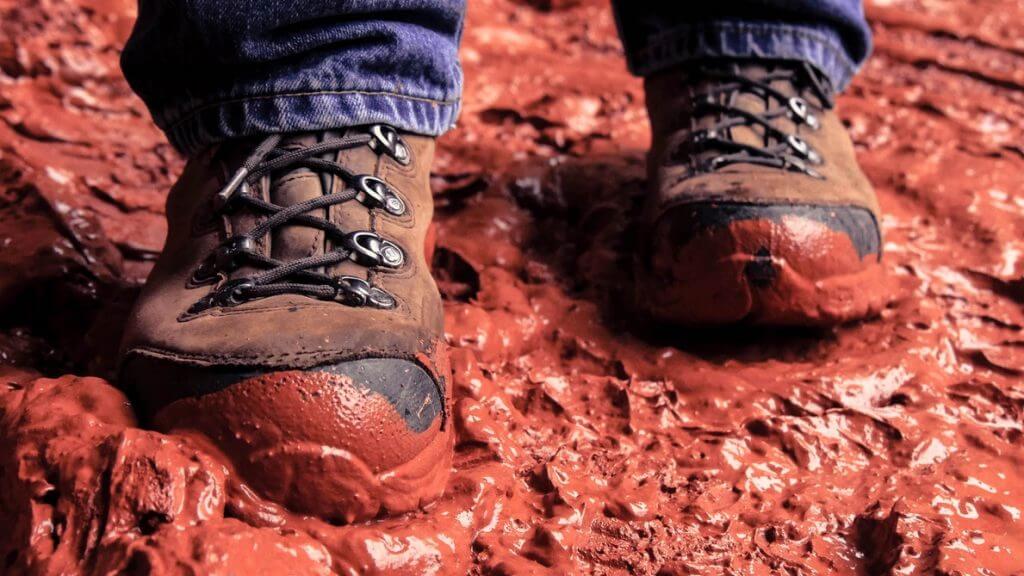
That is so true. Would you say that the Zen Warrior Training wouldn’t exist if it weren’t for the tragic accident that happened?
Yeah, it definitely wouldn’t exist. This has been absolutely a by-product of the accident, everything that I’ve been through. Going through everything that I went through gave me access to my inner healing potential. That’s something that I would not have known about had it not been for the injury. My whole approach to life was very Zen before my injury happened but I hadn’t had that type of challenge to that Zen mindset, to that sense of peace, wholeness, and so forth. The injury created the grist for the mill essentially to go through that dark tunnel of victimhood and come out the other side whole, healed, and put together with a focused mindset and that’s just changed everything in my life. And so, I see now, if I can do that, then anyone can do that. I noticed that pretty much everyone I know has some kind of paralyzing experience that they go through. It doesn’t have to be a spinal cord injury. It can be a divorce. It can be loss of a job. It can be feeling like you’re never able to make the kind of money that you want to make. There are so many different paralyzing mindsets out there. Ultimately, going through what I went through gave me sort of the template for how to move through any type of paralyzing experience.
The Zen mindset is you realized that your circumstances don’t define you. How would you encapsulate a Zen mindset?
The most important aspect of the Zen mindset in my experience is welcoming every experience without judgment. Being open to having experiences without labeling them as good or bad or wrong or right but simply they’re the experience that you’re having. When you neutralize your mindset around the experiences that you’re having, when you are really in the practice of doing that, then you can really flow with life in a way that doesn’t have the types of fight and flight reactions and that type of thing which take us out of actually having an embodied experience.
Yeah because there is a survival mindset that we are oftentimes in looking at this as good, bad, labeling our circumstances and labeling ourselves, right?
Exactly. That’s just a funk mindset in my experience. It never really leads to anything beneficial. Every experience is a learning experience. No matter how good or bad it may seem to the survival instinct that judges the experience, it is what it is. Zen is what it is philosophy.
Let’s talk more about that. It is what it is but sometimes we paint a picture that it’s better or it’s worse than it is. We apply all sorts of meanings. We take something that is a neutral experience and we turn it into something that is traumatic, tragic, and horrific. Basically, we rent out space in our minds for years or maybe even decades to this thing, this trauma because there’s so much story there that we apply to it.
The most important aspect of the Zen mindset in my experience is welcoming every experience without judgment.
In doing so, we give up our power temporarily. As long as we’re in any kind of reaction to the way that things are, we’re actually giving up our power to make the choice of how we experience our circumstances. That, to me, is what to avoid. That’s why I really choose to welcome each experience whether it’s joyful or whether it’s painful. Welcoming it just as what it is. Then I’m not giving my power away. Then I’m able to choose how I experience the circumstances.
Right. It’s a form of acceptance without attachment. I’m not attached to any particular outcome. It is what it is. It’s not more than it is. It’s not less than it is. It just is. I accept all that I have in this experience. I’m not resisting because what you resist persists.
Exactly. It really comes down to the power of surrender. In the Western world, we tend to have this notion around the term surrender, that it means giving up or somehow losing something. But in Eastern philosophies, surrender just means letting go into what is, letting go of trying to control one’s reality so that you can actually be in control of yourself and the way that you respond to reality.
Is it true that we can control ourselves or our reality? Really, if you look at it from a control and manipulation standpoint, there’s really nothing that you truly control except maybe your intention. Everything else is an illusion.
The one thing that you can control is your attitude and mindset. You can’t control any other circumstances of your life but by being able to control your mindset and attitude, you put yourself in an extremely powerful position. That’s the thing that I think a lot of people miss, is that just by simply controlling their mindset and attitude, the world around them begins to change very dramatically.
What would be some small examples of that happening?
I’ll use a personal example. A few years ago, I had a temporary setback that put me in a hospital for about three months and maybe bedridden for about four months or so. I had to have a couple of surgeries done. It was not what I was hoping for. It was coming right at the time when my business was beginning to pick up and it still needed to have that kind of real energy behind it to pick up the way that I wanted it to. This experience, this setback or what could have been perceived as a setback was putting me in a state of inner turmoil. I thought, “Oh my gosh, what am I going to do? Am I even going to be able to run this business if this type of thing happened?” I had all of these thoughts about, “Why me?” I chose to see it as continuing education for Zen Warrior Training. I chose to set a really strong intention that no matter what happened over the course of those four months, that I perceived value in the experience because I got it. If I stayed in the victim mindset, I was not going to be able to get any kind of value out of the experience that I was going through. I was just going to suffer. But if I chose to take the mindset of seeing the value in this suffering, the value in the experience that I was going through, and how this could be applied, then I could actually use it to my advantage and benefit from the challenging experience that I was going through. By setting that really strong intention, I actually did end up doing exactly that. I remember going out with friends just a day or two after being able to sit up in my wheelchair for the first time and we went out and grabbed a meal together. They were commenting. They said, “How is it that you are so happy and jovial right now? You’ve just been bedridden for four months.” I said, “Well, it’s over. It’s all over.” It really reinforced that mindset of being able to benefit from any experience and I’ve used that experience multiple times in the work that I’ve done to be able to help people to make their own shifts and see the value in the challenge that they’re going through.
We oftentimes get stuck in this why me victim mentality. It makes sense when you describe how that’s unnecessary suffering, that you could change your mindset and then get value out of the circumstance that you’re in so that you could use it as fuel or as learning for something that could help other people and bring light to the world. It sounds easy when you describe it but when you’re in it, it’s so hard to step out of it. What are the secrets to snapping out of that? Is it breathe training? Is it repeating mantras? Is it visualization exercises, hypnosis? What’s the secret?
The breath is incredibly powerful because you are essentially using it as a digestive tool for feelings.
You mentioned breath training. To me, breath training is one of the primary sources, the most effective tool that I have learned to use for myself. I use breath training with my clients all the time. The breath is incredibly powerful because you are essentially using it as a digestive tool for feelings. What happens when we are caught in that kind of mindset, that victimhood mindset, is we have some kind of feeling which appears as a sensation in the body that we don’t like. Like the sensation that’s happening in our core, in our intestines, in our heart, or something that just makes life feel off. If we’re not breathing effectively, our minds can then try to get the sensation to go away and so we then end up in a feedback loop between our mental faculties and the sensation which is just a feeling. The feeling in our mental faculties end up in a feedback loop with each other and the more we think I hate having this feeling, I want it to go away, the more amplified the feeling becomes. It’s a vicious cycle of feeling and thinking and feeling and thinking and judging your reality and so forth. But by using the breath, the breath is the digestive tool of feeling. By being connected to your breath, you’re actually able to let feelings move through your system and not be in a fight with your own feelings.
So this is different from let’s say mindfulness where you could focus on your breath or you could focus on your heartbeat, you could focus on the clock ticking in the room or any number of things and you notice your mind wandering, you bring yourself back. You notice that you’re daydreaming or whatever you bring yourself back. This is different though because it really is focused on the breath. Let’s compare and contrast these two things.
They’re complementary. The breath is the physical aspect of this process and the use of mindfulness in terms of being able to track when you go off at certain thoughts and bring yourself back is the mental aspect. When you combine the mental aspect with the physical aspect, that’s why in mindfulness practices, they have you continue to come back and focus on the breath, focus on the sensation of breath because the sensation of breath is our connection to ourselves. It’s where we are still inside of ourselves. Bringing the mind back and having it have a direction, your minds need direction. Our minds without direction will go off and try to problem solve on their own. They’ll think about the to-do list and they’ll think about why didn’t this happen this way. I should be having a different type of relationship with so and so. All of this mental chatter which doesn’t really actually serve the present moment at all so the breath is what’s happening in the present moment. It’s the silent, still vehicle. I feel the breath is actually spirit, that we actually connect to spirit through connecting to the breath. I had a profound experience when my injury first happened which gave me that download, which I can describe if you’d like me to.
Yeah, for sure.
Seven days after my accident happened, I was lying in this hospital bed and I have just gone through a spinal fusion surgery. My whole lower body was paralyzed. My upper body was in a hard shell plastic cast keeping it stable so that my spinal fusion could heal. I had the use of my hands and I could turn my head but that was about it. I was sitting in this dark room. For the first time since my actual injury happened, the doctors took me off morphine that night. I realized that for that entire week, I had been numb to my experience. I had been thinking that things were a lot better than they were, essentially. Not only did the morphine numb my body but my mind was just in ethers. And so when they took me off morphine, suddenly all the trauma kicked in and I became lucid for the first time since my injury happened about what did actually happened to me. I thought, “Oh my God, how the hell am I going to live like this? Am I going to live like this? What does the future hold? All of the things that I love to do seemed impossible at that point. If I had had a sharp object around me at that time, I don’t know if I’d still be here today. The only thing that I could think to do in the midst of this severe anxiety attack was to turn to my breath and just allow myself to breathe deeply for awhile. About 10 minutes into breathing deeply, consciously, the most incredible happened.
Breath just felt about 1,000 times more powerful than anything I had ever experienced before and any breath I had ever experienced.
My system went into complete surrender. I felt the breath not as an inhale or as an exhale but as a constant flow of energy through my body, like I was connected to the universe’s vacuum or something. Breath just felt about 1,000 times more powerful than anything I had ever experienced before and any breath I had ever experienced. It just flowed through me. It was the strangest sensation to not have any sort of sense of what the inhale was and what the exhale was and to literally feel like I was just being kept alive by the universe, like I was on the universe’s life support system. My body went into complete surrender and my mind went into complete surrender. I was able to see that the identity, who I thought I was, wasn’t actually who I really was, that I was actually the consciousness experiencing that identity. That’s who I really was. I was a far more vast and expanded consciousness, not a fixated identity. That was a moment that lasted for about probably an hour or more where I thought, “Oh my God, I’m being healed right now. I’m going to walk out of this hospital tomorrow morning.” That was literally the thoughts that I was having. All of the anxiety that I’ve just been feeling 10 minutes before, the deepest, darkest depression of my entire life was gone. I was in this state of pure surrender. It put me into a state of being connected to a sense of eternity. In that space, my injury seemed relatively inconsequential on a greater scheme of things. This was all through the breath. This wasn’t through some type of journaling or anything like that, this was through breathing. I just had this really strong download that just basically said breath is spirit, breath is life.
Wow. That’s profound.
Yeah, it was amazing.
Have you had any kind of that level of profound experience with the breathing exercises since then or was that the pinnacle?
That was the pinnacle. I have had other profound experiences but what my experience is that those types of things, those types of experiences only happen when and if it is absolutely necessary for one system to go through that type of experience. In that moment, that was what was needed. You can’t force another experience that is profound and enlightening. I try to all the time, believe me. I do breathwork experiences all the time and I’m always looking for the next profound thing. A lot of the time, it’s not all that exciting but it does keep me connected to my vitality. It’s maintenance now for me. I have had a few other profound experiences and leading clients through breathwork practices. I’ve seen them go through some very profound experiences. I’ve seen them totally go into a trance where I’ve said, “Okay, you can stop now.” They just keep going and keep going. They don’t even hear me talking to them because they’re so deeply entranced by the breath. The breath is doing its work on them. It’s a really profound thing to witness and to experience.
Did you heal significantly in a short period of time probably because of this breath experience? You had the doctors come to you and say, “You’ve had some miraculous healing going on and we don’t know what to attribute it to but you’re very lucky that you’ve had this level of healing?”
My physical symptoms of the injury of complete paralysis from the waist down were always consistent. In that respect, I was no different than pretty much anyone else who has had what doctors call complete spinal cord injury. But the healing took place on an energetic level. A few months after my injury happened, I began working, studying movement and breath and meditation with a woman who started a program called continuum movement, which is actually why I moved to LA, because she was based in LA. She since passed but I studied intensively with her. She helped me to use breath and sound vibration and micro-movements, really just the tiniest little movements that aren’t even muscular movements, but tiny little movements, to reconnect with my body, with the injured part of my body. I went through this whole experience of feeling disassociated from my lower body after my paralysis happened, like there was a live part, and then there was a dead part. I would look at my body and it looked like I was carrying around someone’s dead limbs on my body. It’s very bizarre.
Through the continuum movement work, I was able to re-establish that energetic connection all through my body so that I could feel whole espite the paralysis.
Through the continuum movement work, I was able to re-establish that energetic connection all through my body so that I could feel whole, so that I could experience myself as whole despite the paralysis. A lot of people who have had paralysis and who have not had that type of healing will go on for their entire lives with this what I would call a disability imprinting in their systems. You can just energetically feel the disability. Whereas with me, I happen to be in a wheelchair but I’m healed, I’m whole. Often times, people don’t even see the chair because it’s like I’m sitting on it because it’s convenient. That’s how much healing I’ve had around the injury. On an energetic level, I went through complete healing. On a physical symptom level of the paralysis, I maintain the same level of dysfunction or lack of function that I always had since my injury happened but on an energetic level, I’m whole.
You definitely have this air of vitality about you.
Thank you.
It’s awesome. It’s refreshing. It’s invigorating.
Thank you.
I would just briefly share kind of a similarly profound experience for me where I used breath as a gateway to other realms. This was on a trip to India. It was at Oneness University in the Oneness Temple. We had this breath exercise where you keep breathing fast until you get to a state where your extremities feel like they’re on pins and needles. It’s called [00:20:13]. I visited these different realms in like the animal kingdom and the plant kingdom and the realm of the DADs, the realm of the supreme light and so forth. They’ve got these seven realms and we were on this guided journey. It was so profound. I really felt like I was there. In the animal kingdom, I apologized to all the animals that I had eaten all my lifetime. I felt their pain. It was really profound.
Wow. So you have experienced these type of profound experiences. That’s awesome. You’ll have to lead a breathwork workshop with me sometime.
I don’t know if I could lead one. I could certainly participate.
That’s awesome. That’s amazing. That’s the type of profound thing that I’m talking about. That’s really cool.
Part of all the self-work I’ve done has helped me to understand that I’m a consciousness beyond my identity. Almost everybody can’t even answer the simple question of who are you.
Yeah. They come out with a laundry list of where they went to school and where they’re from and that type of thing.
Yeah, labels. Just roles, and we’re not that.
We are not that.
We do that. We have these things. We do these things but we are not these things.
Yes, exactly.
How do you wrap your head around that unless you actually go through one of these definitive transformative exercises? I don’t even know if you can. Could you give just an explanation using words that people could get, that you’re more than just your identity, you’re a consciousness that’s essentially unlimited. Is it even possible to just explain?
It’s possible to experience in the explanation the point that’s lost because in the explanation, we try to come up with a conceptual framework for what we might be talking about. Then it becomes an intellectual exercise and then it becomes, does this check out with my existing framework? Does this not check out with my existing framework? Which then opens that door away for judgment. Is this guy a looney toon? And so, that conceptualization, that intellectualization of reality and identity and the nature of consciousness is ultimately fugal. You can do it all day. Most people do it all day to a certain degree. It doesn’t really bring any kind of profound results. But if you practice being connected to your breath, you practice meditation and you just really show up to go through whatever you need to go through to see that you are not the thoughts in your head and you are not the feelings in your body and you’re not the story that you tell yourself, that takes a lot of discipline and courage to do. I have to say most people are not up for the task. They would prefer to stay in their comfort zone of what they’re used to and how they are used to identifying as opposed to actually confronting what they identify with and examining it to see if it’s actually real. Most people are simply not up to the task of doing that because it can be a very disconcerting process.
Or a liberating process.
Exactly. It usually starts out disconcerting in the process to becoming liberating. Certain people would get stuck in the disconcerting part. I don’t know how many times I’ve talked to people who said, “I’ve tried meditation but it just drove me crazy. I was just thinking more than I’ve ever thought.” They get disconcerted. They get sort of thrown off by the practice but ultimately, the practice is really more simple than that. It’s learning to see all of this stuff come up. Rather than get disconcerted by it, remove oneself from the drama, remove oneself and have an understanding that the subconscious mind is not the end all, be all. The subconscious mind will create all of these thoughts and projections and stories that are based on incomplete truths from our past. One has to learn to identify it and see that process occurring in real-time and go, “Oh, okay. I’m not that projection. I don’t have to follow this thought, path. I don’t have to get obsessed with this feeling.” Just noticing all of that and continuing to bring yourself back eventually, one can start to remove oneself and be the observer rather than feeling like they are the object of observation.
Remove oneself from the drama, remove oneself and have an understanding that the subconscious mind is not the end all, be all. Share on XIt’s so conceptual and far out there for somebody who hasn’t had this experience to be the observer.
Yes.
To think that I am not my thoughts and feelings, I am not my body, then what am I?
Exactly. The beauty of it is that you’re far more than your thoughts and feelings and you’re far more than your body. You are consciousness itself. We really undersell ourselves on reality pretty dramatically on a regular basis. We think that we are the jobs that we have and the school that we went to and the spouse that we have. We identify with all of these things that are not us at all. When you can start to actually experience yourself as consciousness itself, then there’s a feeling of infinite spaciousness inside that experience. That’s how I would describe this. Infinite eternal spaciousness. What I’m always trying to do is help people to bridge that experience of being consciousness itself and being eternal and being infinite with the practical day to day needs that they have to live their life, accomplish their goals, live in the mindful of their intention, etc.
We are infinite spaciousness. We’re not our minds. We’re not our bodies. We’re not our thoughts and feelings. We have these things. We have thoughts. We have feelings. We have a body. We have a mind but we are the space, the context in which these things occur.
Yes. I could not have said it better.
What would be a good example of a shift that maybe one of your clients or somebody you know made where they realized, “I am the space. I am the nothingness in which things occur.” It’s a fundamental shift in everything. It’s like taking which one’s the pill in the matrix.
The blue pill.
The blue pill. Okay. It’s like you just took the blue pill. You want to share any example of somebody that you worked with that tool the blue pill?
It really is the challenge to come to terms with who we really are versus who we think we are.
A young client who’s only 17 years old. He has dealt with deep anxiety his entire life. When I met him, he was isolated, very isolated, very withdrawn. When I started to train him in seeing that he wasn’t his thoughts and helping him to observe the thoughts but not get taken away by them, I saw him go through this really massive transformation where he really came out of his shell for the first time and now he’s helping other kids who he knows to see that their own thoughts, their own anxieties are not who they are. I think that this has really put him on a path. My feeling is that we, on some level, on some unconscious level, we choose the path that we are on. We choose what we’re going through. My feeling is he chose to go through this particular type of intense challenge in order to help others alleviate the suffering of their own anxiety. By doing so, he’s going to really feel his purpose in the world. I’m really proud of him. I think he’s done an amazing job. I know that it’s not easy to do that. It is the challenge. It really is the challenge to come to terms with who we really are versus who we think we are.
When you do connect with that greater sense of self or that self really is a construct that we make and we’re not self, we’re just part of a collective consciousness, then you unleash so many possibilities. So much potential becomes available to you that wasn’t available before. Your wounding now is your biggest gift because that is on a spiritual level what you’re here on earth to do is to not be the wounding but to have the wounding as an opportunity to heal others through your experience.
Exactly. My paralysis, the physical paralysis that I’ve experienced has been just a catalyst that I’ve needed to be able to help other people to overcome their own paralysis in their lives. One thing that I’ve always noted is that while there may be a disruption in sensation, motor function in the lower part of my body, it’s only my mind that can be paralyzed. It’s only my mind that can actually stop movement. When you really get that and no matter whether you deal with physical paralysis or any other kind of paralysis, but when you really get that it is only your mind that can stop movement in your life, then you know where to focus, you know where to put your attention. You know to bring your attention to loosening up the binds of story and identification and bringing your awareness into that empty space that you just described so eloquently, bringing it inside to that empty space inside yourself where your pure consciousness itself. That is the direction to go to create movement in your life. And then bringing that into relationship too is another essential part of this as well because it’s one thing if you just really learn how to meditate really well and you move out into the middle of nowhere and you become some enlightened individual who lives in a cabin somewhere but then that person might never have the ability to relate to other people because they have used that skill in one particular way. The real challenge is taking that skill, being really open, really conscious, really expanded and then applying it in relationships.
Because in order to effect change, you have to be in relationships. You can’t just hole yourself up on a mountain top like some sort of guru. The gurus teach others.
Exactly.
They’re eternal students so they’re learning and teaching at the same time.
Most gurus have never been in marriages. That is a whole other element of challenge to an enlightened presence.
Exactly. Most gurus have never been in marriages. That is a whole other element of challenge to an enlightened presence.
That’s where the rubber meets the road, right?
Exactly. You got it.
Can you have these sorts of experiences, these epiphanies in other ways beyond the breath? For example, I had a really profound experience in a float tank, in one of those sensory deprivation tanks. No lights, I was floating, and there’s a lot of epsom salt in the water so you just float and I wasn’t even touching the sides so I felt blissed out like I was half a body at that time. It was like an hour long float experience and I’ve only done it once so I don’t have a lot of experience to compare it to but it was profound. I was at the time going through this practice for a month of looking back at situations where I hurt somebody in my past and just re evaluating, re experiencing it but doing it differently this time. Being who I am now, I wouldn’t have been in that same way, done those same things, and said the same things that I had said back then. It’s like a four step process. You recognize a past hurt that you inflict on somebody. You really come to terms with it. Get real about it and understand the hurt that you inflicted in not just kind of an esoteric way but in a very raw and real sort of way. You try and put yourself in that person’s shoes. What was it like? I took a video of me after the float tank experience. I’ll walk you through that. I have an ex wife. I finally got it, what it was like for her having a stepdaughter who I didn’t truly accept. I have lots of reasons and excuses and all that. I was 19 when we got married and I didn’t have the skills blah, blah, blah but that’s all nonsense. That’s all story. The reality is she was in a double buy in because I was not a good step parent and she had to choose either leave the marriage, because we got married, I was 20 at the time, or stay in the marriage and know that her daughter, my stepdaughter was going to be rejected time and time again because I didn’t know how to handle being a good step father. I just wasn’t capable at that time. I got it. I really got it at a visceral level. That double buy in and how agonizing that must have been for her. This is part of the process where I went through a whole bunch of situations where I had been unkind or hurtful or whatever to different people that didn’t deserve it, who were people that I loved. Anyways, that was powerful, very, very powerful. I had done that practice for a week and then I fell off the practice for a week and then it all came in a whoosh. Like in an hour, it seemed like I did a year’s worth of that work in the float tank.
Wow. I’ve been meaning to try a float tank. It sounds like an amazing experience. To answer your question, I think there are multiple ways of connecting to that eternal, infinite, spacious consciousness, the breath being one of them. Although it seems like while the modality might seem different, whatever the modality is, it’s still connecting you to your breath. When you’re lying in the float tank, what’s happening, you’re just there with your breath because the rest of your body goes into a state of total flotation and your senses are gone. The only experience is your breath moving in and out of your body so in a sense, it’s just another modality to get you connected to your breath. Prior to my injury happening back when I was a kid, I used to experiment pretty regularly with psychedelics and those were actually my first experiences in this expanded state of consciousness.
They provided an accelerator into that state which I do not know if it had not been for those experiences, I don’t know that I would have had the extraordinary experience that I described with the breathing after my injury happened or any number of things. It could be that those types of experiences were just as much grist for the mill as my injury for the type of work that I’m doing these days because they really did serve as catalyst. Not that I’m here promoting psychedelic drugs. That’s up to anyone to decide whether to use them or not. But for me, they did serve as a catalyst to that expanded state of consciousness. That’s not something that one can maintain more than a few hours while under the influence of them and then it becomes really hard to integrate those experiences. That’s the challenge then. Once you’ve had that catalyst experience, then how do you integrate that into the rest of your life because our subconscious minds operate in such a manner that the thoughts that we normally think are going to come back even if we’ve had this really expanded experience. The ways that we identify ourselves are so embedded in our subconscious that they’re going to come back until you really practice the discipline of doing the meditation, of doing the breath work, of doing whatever you need to do to consistently tap into that more spacious state.

I know we’re short on time here but just one point about the psychedelic drugs, I have never done drugs myself but I had an experience in India that felt like it could have been a psychedelic experience because after I was touched by the oneness monks, everything, the colors were incredible like in a cartoon, technicolor. The green of the grass was the brightest green I have ever seen. I felt so connected to the fabric of creation, to the creator and I had been agnostic my whole life before this experience. The monks, they say that the divine is an experience, not a belief. That sounds really good and makes a lot of sense but when you experience what that means, everything shifts. It didn’t take psychedelic drugs. It just took getting touched on my head by this monk.
Amazing.
I’ve gotten what’s called a deeksha before from others but this one in particular was that catalyst for me that changed everything.
That’s amazing. We all have the capacity to be enlightened. It doesn’t take any kind of stimulant. It just takes the circumstances of one’s life creating that opening. That’s incredible. That’s a really wonderful story.
I guess the bottom line here is to be intentional, to approach this as a practice, that this isn’t just a waft to shed all the expectations and just let it be. If you don’t get that profound life-changing experience your first time, that’s totally fine. Accept it and just keep doing it because it’s in the practice that you get the benefits, not in just some one off.
Exactly. I think the greatest obstacle, in fact, I just blogged about this not long ago, the greatest obstacle or the greatest impediment to people practicing meditation or breath work or whatever is that we tend to be so results-oriented. You have to really shift out of a result orientation in order to experience what we’re describing. It’s completely paradoxical. The less you focus on results, the more results you get.
The results are like a side benefit.
Exactly.
Amazing. If somebody wanted to take your Zen Warrior Training, how do they get in touch with you if they wanted to work with you, have you as their coach? What’s the process?
They can contact me through zenwarriortraining.com. Sign up for my newsletter there. you can also follow me on Twitter @zwtraining, Instagram @zenwarriortraining, facebook.com/zenwarriortraining.
Thank you so much, Sam. This was such an awesome experience to be on this journey with you over the last hour. I hope our listeners are going to take some action now because that’s where the rubber meets the road.
Exactly. Thank you, Stephan. It’s been a pleasure.
Listeners, this is Stephan Spencer, your host, signing off. We’ll catch you on the next episode of Get Yourself Optimized.
Important Links
- Jonathan Fields – previous episode
- Breath training
- Hypnosis
- Continuum Movement
- Float tank (isolation tank)

